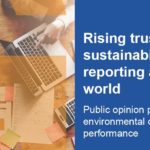
When it comes down to assessing corporate sustainability performance and impacts, investors, rating agencies and other stakeholders have developed a growing appetite for accurate, relevant, consistent and comparable data. In a globalized world prone to economic volatility, alternative facts and corporate scandals, solid financial and “non-financial” disclosure is expected to serve them as a beacon of trust in a complex planning environment. The recently published Edelman Trust barometer for 2017 finds that, in a world where average trust levels have dropped below 50 percent, business remains “the one institution that retains some trust with those skeptical about the system, to prove that it is possible to act in the interest of shareholders and society alike.”
With the demand for reliable corporate disclosure being on the rise, so is the importance of assurance, particularly in unveiling inconsistencies, materially false or misleading information in financial, sustainability, and integrated reports.
Read the full article by Michael Laermann



